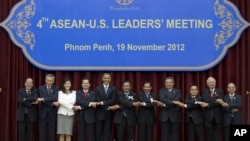WASHINGTON DC - Asean’s Human Rights Declaration is coming under heavy criticism from international organizations and US officials, but some rights experts say it can be improved as time goes on.
Rights advocates worry about vague language in the declaration that could shield autocratic regimes from abiding by international human rights norms. Supporters say the document will reenforce already existing international protocols.
“It’s not perfect, but that doesn’t mean it should be denounced,” said Christina Cerna, a professor at Georgetown University in Washington. “I think it is up to civil society to continue to push for improvement.”
However, critics say that will mean more and more demands from traditionally closed regimes across the region, many of whose rights records are spotty. The declaration makes allowances for curbing freedom of assembly, for example, to protect national security or public order, phrasing that critics say provides a loophole for crackdowns on public demonstrations.
However, Cerna said that Asean has gone for more than 30 years without a rights declaration, and the new document creates a baseline for improvement. Civil society can now push for better protection mechanisms and file complaints with the Asean Intergovernmental Commission on Human Rights, she said.
Supporters of the document within Asean say it is up to international standards and does nothing to contravene the Universal Declaration of Human Rights and international rights laws.
Meanwhile, the declaration has opened more dialogue on regional rights issues. US officials and international rights advocates met recently in Washington to discuss ideas that are not always talked about.
In a US-Asean symposium to discuss the declaration in November, Daniel Baer, who is in charge of the human rights bureau at the US State Department, voiced “deep disappointment and concern” with the declaration, which was passed by Asean Nov. 18.
The declaration’s language “could be interpreted as undermining the universal rights and freedoms” within the Universal Declaration of Human Rights and the International Bill of Rights, Baer said. The declaration could also “advance caveats based on cultural relativism, subordination of universal principles to domestic law, novel or unique limitations to universal rights, and group veto potential over individually-held rights.”
Asean Rights Declaration ‘Not Perfect,’ But Can Be Improved, Expert Says
- Sok Khemara
- VOA Khmer







